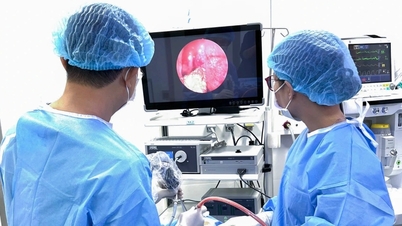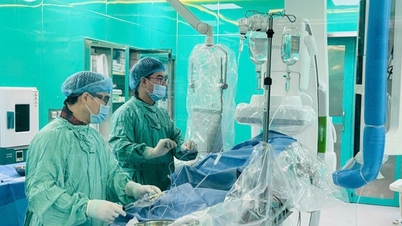Dementia is more than just severe memory loss and confusion – it can actually have a huge impact on physical abilities.
Dementia describes a group of symptoms that affect memory due to damage to the brain (such as Alzheimer's disease). Dementia affects cognitive abilities, but one expert warns the condition can also affect the throat.
Although there is currently no cure for dementia, a diagnosis is essential to ensure you get all the support you need. Certain medications and therapies will help alleviate some of the side effects or slow the progression of the condition.

Difficulty swallowing is a common side effect of worsening dementia (Photo: Getty Images/iStockphoto)
Dr Ahmad Khudakar, Senior Lecturer at Teesside University (UK), pointed out that an 'unusual' sign of dementia is difficulty swallowing. Medically, it is called dysphagia.
“This condition is caused by damage to areas of the brain responsible for movement and coordination, including the area that controls the swallowing reflex,” the expert explains. “People with this condition often have muscle weakness, coordination problems, and reduced sensation in the throat, leading to difficulty swallowing.”
According to the UK government's National Health Service (NHS), difficulty swallowing is often a sign in the later stages of dementia.
Of course, difficulty swallowing can also be caused by other, less serious problems, such as heartburn, acid reflux, and even a potential side effect of some medications. However, if you are concerned about your symptoms, it is important to see a doctor.

Photo: gastroconsa
Other common signs of dementia to watch out for
- Memory loss
- Difficulty performing familiar daily tasks
- Difficulty concentrating
- Mood swings
- Confused about time and place
- Struggling to keep up, follow a conversation, difficulty communicating or finding words.
Source


![[Photo] The road connecting Dong Nai with Ho Chi Minh City is still unfinished after 5 years of construction.](https://vphoto.vietnam.vn/thumb/1200x675/vietnam/resource/IMAGE/2025/11/04/1762241675985_ndo_br_dji-20251104104418-0635-d-resize-1295-jpg.webp)
![[Photo] Ca Mau "struggling" to cope with the highest tide of the year, forecast to exceed alert level 3](https://vphoto.vietnam.vn/thumb/1200x675/vietnam/resource/IMAGE/2025/11/04/1762235371445_ndo_br_trieu-cuong-2-6486-jpg.webp)

![[Photo] Ho Chi Minh City Youth Take Action for a Cleaner Environment](https://vphoto.vietnam.vn/thumb/1200x675/vietnam/resource/IMAGE/2025/11/04/1762233574890_550816358-1108586934787014-6430522970717297480-n-1-jpg.webp)
![[Photo] Panorama of the Patriotic Emulation Congress of Nhan Dan Newspaper for the period 2025-2030](https://vphoto.vietnam.vn/thumb/1200x675/vietnam/resource/IMAGE/2025/11/04/1762252775462_ndo_br_dhthiduayeuncbaond-6125-jpg.webp)
































































































Comment (0)